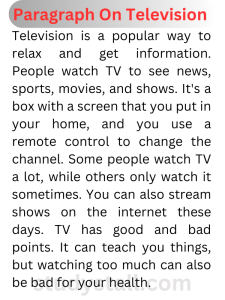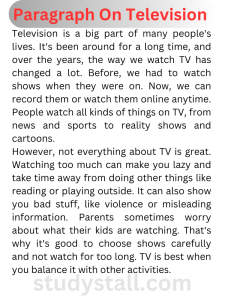Television has become an integral part of our daily lives, revolutionizing the way we consume information, entertain ourselves, and stay connected with the world. In this modern era, television serves as a powerful medium that combines audio and visual elements to deliver a wide range of content to viewers. From news and educational programs to thrilling dramas and entertaining reality shows, television offers a diverse array of options to cater to various interests and preferences.
Paragraph On Television 100 words
Television is a popular way to relax and get information. People watch TV to see news, sports, movies, and shows. It’s a box with a screen that you put in your home, and you use a remote control to change the channel. Some people watch TV a lot, while others only watch it sometimes. You can also stream shows on the internet these days. TV has good and bad points. It can teach you things, but watching too much can also be bad for your health.
Paragraph On Television 200 words
Television is a big part of many people’s lives. It’s been around for a long time, and over the years, the way we watch TV has changed a lot. Before, we had to watch shows when they were on. Now, we can record them or watch them online anytime. People watch all kinds of things on TV, from news and sports to reality shows and cartoons.
However, not everything about TV is great. Watching too much can make you lazy and take time away from doing other things like reading or playing outside. It can also show you bad stuff, like violence or misleading information. Parents sometimes worry about what their kids are watching. That’s why it’s good to choose shows carefully and not watch for too long. TV is best when you balance it with other activities.
Paragraph On Television 300 words
Television has been around for many years, and it’s a big source of entertainment and information for people all over the world. You can turn it on to catch up on the news, watch a sports game, or enjoy a movie. These days, you can even connect your TV to the internet and watch whatever you want, whenever you want.
However, there’s also a downside to watching too much TV. It can make you inactive and can lead to health problems like gaining weight. Also, some shows or advertisements can give people wrong ideas or make them want things they don’t need. For kids, too much TV can get in the way of doing homework or playing outside, which is healthier.
Despite these issues, TV also has a lot of good points. Educational shows can teach kids important stuff in a fun way. Documentaries can help people learn about the world. News programs keep people updated on what’s happening around them. But like anything, it’s important to use TV in a smart way. This means choosing what to watch carefully, and not letting it take up all your time. So, the next time you pick up the remote, think about what you’re watching and how long you’ve been sitting there. Balance is key.
Paragraph on Television 500 words
Evolution and Impact
Television has come a long way since its inception. Over the years, it has evolved from bulky black and white sets to sleek, high-definition screens with vibrant colors and crystal-clear images. The advent of cable and satellite television has further expanded the choices available to viewers, providing access to a vast array of national and international channels.
Television plays a significant role in shaping public opinion and disseminating information. News channels keep us updated on current events, allowing us to stay informed about local and global happenings. It serves as an essential tool for journalism, highlighting social, economic, and political issues. Interviews, documentaries, and debates provide viewers with insights and perspectives that contribute to a well-informed society.
Entertainment and Cultural Influence
Television is not just limited to news and information; it is also a major source of entertainment. With a plethora of channels, television offers a wide range of genres to suit every individual’s taste. From captivating dramas that transport us into different worlds to hilarious sitcoms that provide a dose of laughter, television offers endless choices for relaxation and enjoyment.
One cannot underestimate the cultural influence of television. It has the power to shape societal norms, influence fashion trends, and popularize certain ideas and beliefs. Television shows often reflect the values, traditions, and lifestyles of different cultures, providing viewers with a glimpse into diverse societies. This exposure promotes cultural understanding and tolerance, fostering a sense of unity among communities.
Educational Value
Television serves as a valuable educational tool, particularly for children and students. Educational channels and programs offer informative content that enhances learning outside the classroom. From documentaries showcasing wildlife and nature to educational animated shows that teach fundamental concepts, television can make learning engaging and interactive. It caters to various age groups, providing age-appropriate content that stimulates intellectual growth and curiosity.
Additionally, educational content on television can bridge the gap between students in remote areas and quality education. It can reach areas where educational resources are limited, providing access to valuable knowledge and enhancing educational opportunities for individuals who may otherwise be deprived of such resources.
Social Impact and Community Building
Television acts as a social connector, providing a shared experience for individuals within a community. Watching popular shows or live events simultaneously creates a sense of togetherness and fosters conversation and engagement. It allows people to connect with others who share similar interests and provides a platform for discussing and debating various topics.
Moreover, television serves as a window to the world, exposing viewers to different cultures, perspectives, and lifestyles. It promotes empathy and understanding by showcasing diverse stories and experiences. Television can help break down stereotypes and prejudices, encouraging a more inclusive society.
Criticism and Limitations
Despite its many benefits, television also faces criticism and limitations. Excessive television consumption can lead to sedentary behavior and a lack of physical activity, contributing to health issues like obesity. Furthermore, the presence of violent or inappropriate content on certain channels can have negative effects, particularly on young and impressionable minds.
Commercialization and the presence of advertisements on television can also be seen as a disadvantage. Excessive advertising can interrupt the viewing experience and influence consumer behavior, often promoting materialism and consumerism.
Moreover, the availability of numerous channels and shows can lead to information overload and a decrease in quality content. It is essential for viewers to be selective and discerning in their choices to ensure they consume valuable and relevant content.
Conclusion
In conclusion, television has transformed the way we receive information, entertain ourselves, and connect with the world. It serves as a powerful medium that offers a wide range of content, from news and educational programs to entertainment and cultural shows. Television plays a significant role in shaping public opinion, promoting cultural understanding, and enhancing educational opportunities. However, it is crucial to be mindful of its limitations and make conscious choices to ensure a balanced and enriching viewing experience.
FAQ
- What role does television play in shaping public opinion?
Television plays a significant role in shaping public opinion by keeping us updated on current events and highlighting social, economic, and political issues. - How does television influence cultural norms and trends?
Television has the power to shape societal norms, influence fashion trends, and popularize certain ideas and beliefs through its portrayal of values, traditions, and lifestyles. - How does television contribute to education?
Television serves as a valuable educational tool, especially for children and students, by offering informative content through educational channels and programs. - What kind of entertainment options does television provide?
Television offers a wide range of entertainment options, including captivating dramas, hilarious sitcoms, and various genres to suit every individual’s taste.
